
AI & SEO - Why Foundational Strategies Like Link Building Still Matter
Did you know that the first artificial intelligence (AI) was built in 1950? But there have been rapid developments since then.
In 2025, AI is reshaping search engine optimization (SEO) in how people search online, how results are displayed, and how businesses appear online.
With tools like Google’s AI Mode, ChatGPT, and AI Overviews gaining traction, we’re entering a new space of natural language processing (NLP) and machine-generated answers. This has major implications for SEO.
Some marketers wonder if traditional SEO strategies still matter, and others are scrambling to figure out how to get their content featured in AI-driven results.
So, where does that leave link building, content strategy, and search engine rankings in a world driven by AI algorithms and summaries?
In this guide, we’ll break it all down. We’ll cover how AI search works, what it means for traditional SEO, and why link building and branded mentions still matter.
What Is AI Search?
AI search is when people type their query into platforms like Google, ChatGPT, or Perplexity and, instead of getting a list of blue links, they get an instant answer generated by AI.
It’s already catching on as over 15 million U.S. adults currently use AI search as their primary method of online search, and that number is projected to reach 36 million in four years.
While AI search only accounts for 2.96% of search traffic today, two-thirds of consumers believe AI will replace traditional search within the next five years.
It’s faster, more conversational, and often pretty accurate. But what’s actually happening? Let’s discuss:
AI search vs. traditional keyword-based search
Let’s start with the basics. Traditional search engines like Google or Bing are built around keyword-based retrieval. You type in a query like “best SEO tools 2025” and the search engine scans its index for pages containing those keywords, ranks them based on its algorithm, and presents them as a list of links.
AI search, on the other hand, flips the script. Instead of showing you a list of results, it reads through them for you, summarizes key information, and delivers an answer. These answers are often full sentences or natural language, like in the example below:
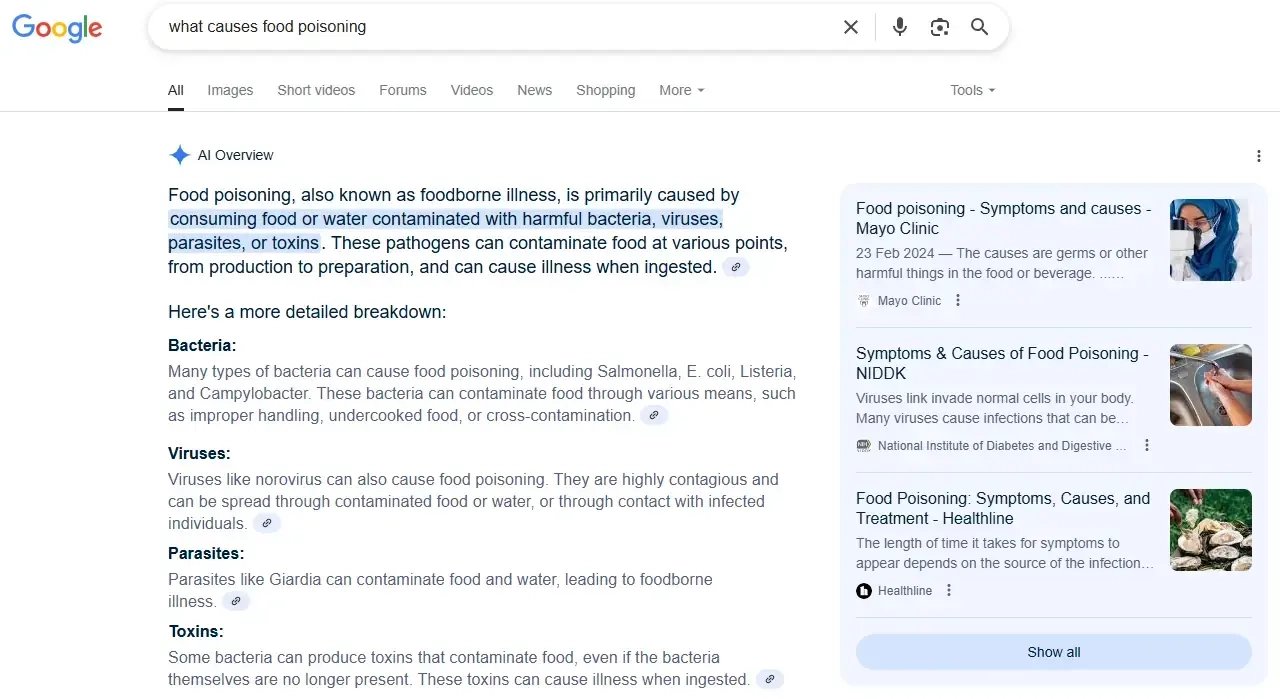
That’s because these tools are powered by large language models (LMMs) like GPT-4, which is used by Gemini and Google’s AI Overviews.
These models are trained on massive amounts of data and generate human-like responses to questions. But, here’s the important bit: LLMs aren’t always all-knowing. They need fresh, accurate, and real-time data to give accurate results.
How AI-powered search engines work (and why it matters)
When you ask an AI search a question, it doesn’t always go out to search the internet in real-time. In many cases, the answer comes from the AI’s training data, which is a massive dataset of information it learned.
But when the question involves current, time-sensitive, or location-specific information, like asking for the best running shoes in New York right now, the AI needs up-to-date information. That’s where retrieval-augmented generation (RAG) comes in. Here’s how it works:
1. Querying a search engine: The AI model sends your question to a real search engine and retrieves the top results.
2. Parsing the results: It reads and processes the content on those pages.
3. Generating an answer: Using what it learned from the information, it summarizes the most relevant data and responds to your query in a conversational way.
So, while the final output feels like it’s coming directly from AI, it’s actually heavily influenced by whatever the search engine decides is worth showing in the first place.
Who’s leading the AI search race?
There’s a growing list of platforms jumping into the AI search game, and they all have their own quirks. Let’s unpack some of the larger ones to consider:
Google AI overview and search generative experience (SGE): This is Google’s take on AI search, which is used by 38% of consumers. It generates a summarized answer at the top of the search results, with citations pulled from various sources. Google is also testing AI Mode in Chrome, which gives you the ability to further search its AI overview and ask it to elaborate on its response
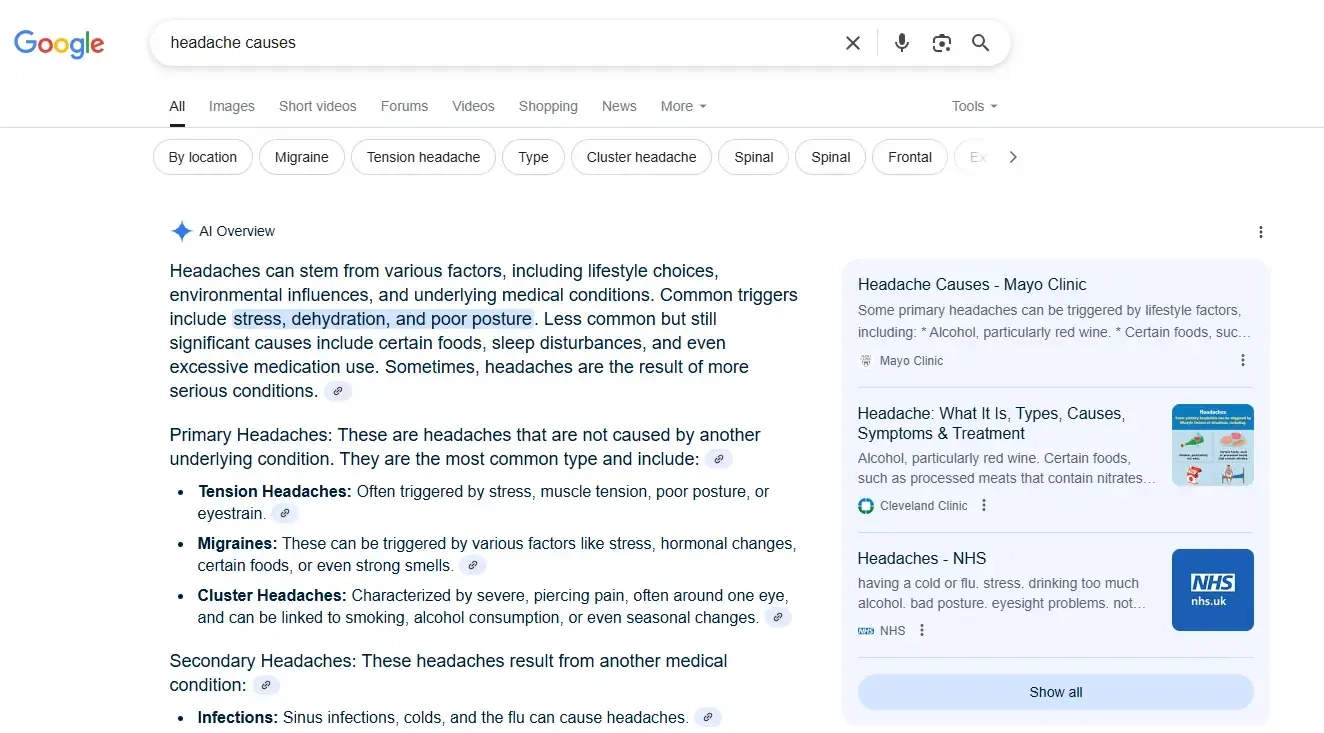
Perplexity.ai: A fast-growing AI search engine that’s possibly more transparent than Google. It always shows citations and often gives multiple perspectives. Perplexity is powered by LLMs like GPT-4 and Claude, and it queries the web in real-time for every search.
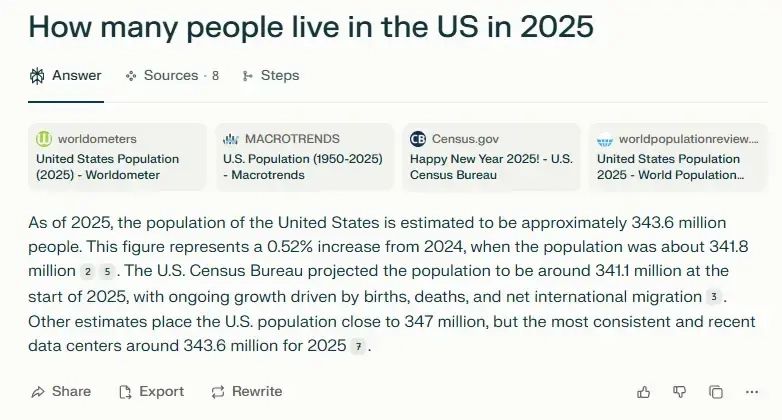
ChatGPT: When you enable browsing mode, ChatGPT performs live search queries and summarizes web content. This means it can give you answers that reference real articles, blog posts, or product pages, provided those pages have good search engine rankings. This is the reason why 49% of consumers use ChatGPT to search for information.
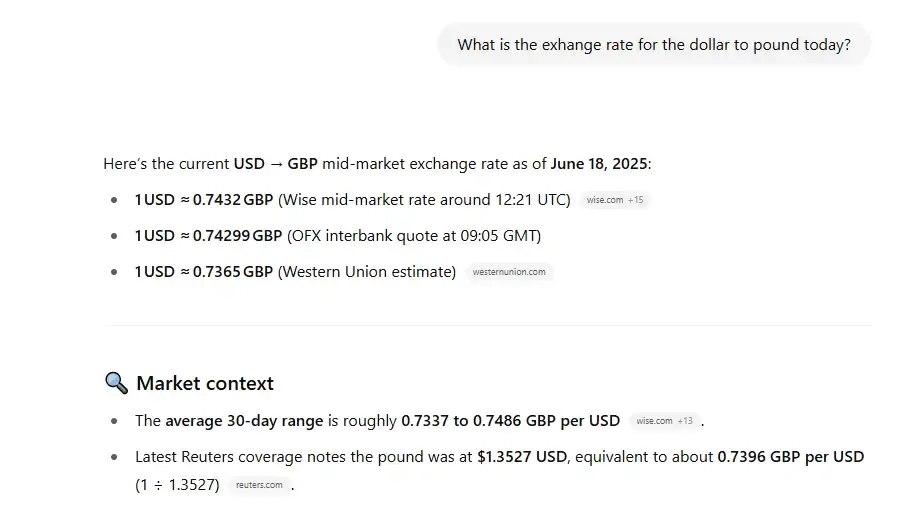
Gemini: Google’s LLM-powered chatbot that’s increasingly being integrated into the search experience across Google Workspace. It also pulls information from live search results to provide its answers.
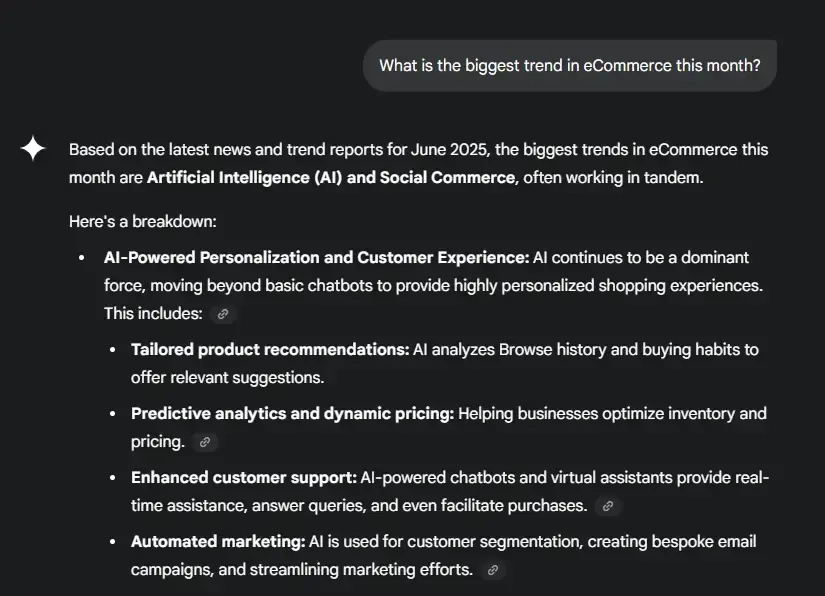
AI search still depends on traditional rankings
Here’s the kicker: for all their futuristic flair, these AI tools are still fundamentally dependent on traditional search engines and the results they return.
If your content doesn’t show up in search engine results pages (SERPs) for a relevant query, chances are AI won’t find you, and it definitely won’t feature your site in its summary. We’ll dive deeper into this later in this article.
How AI Is Changing SEO
AI search is fundamentally shaping how people find and interact with content online. Tools like Google’s AI Overviews and ChatGPT's browsing mode don’t just link to information, they synthesize it. This gives users fast, conversational answers.
And users are responding: over 40% of consumers now say they rely more on AI-generated summaries than on actual links in search results.
From a user’s perspective, that’s incredibly convenient. But for SEO professionals and brands trying to drive traffic and visibility, it’s a major shift.
The old rules of SEO are shifting
In the traditional world of SEO, your goal was simply: rank on page one of Google. Get the click and get the job done.
Now, AI Overviews are taking over those prime spots in search results and sometimes completely replacing them.
Instead of clicking through to your page, users might get everything they need from an AI-generated summary. Your brand? Well, it might still be cited, or it might be invisible.
AI search still needs content (ideally yours)
Despite how futuristic it feels, AI search can’t just invent facts. These AI-powered tools rely on existing web content to generate responses, including blog posts, product pages, guides, reviews, and even interviews.
52% of sources mentioned by Google AI Overviews rank in the top 10 search results, and the top 50 domains on Google get nearly 30% of all overview mentions.
Visibility is now about more than just search rankings
Before AI, if you ranked in the third spot on Google, you could expect 27.6% of all clicks. Now, even if you rank on page one, you might not get a mention in an AI summary. That’s the reality brands are facing.
The algorithms aren’t just looking for relevant keywords anymore. They’re analyzing user intent, authority, topical depth, brand mentions, and structured data. They do this all to try to figure out which source is worth including in a summary. Currently, AI overviews mention an average of five sources per query, and you need to be one of them.
Why this shouldn’t scare you
Here’s the silver lining: showing up in AI search is still 100% doable.
In fact, you probably already have a lot of the pieces in place, including content creation, decent rankings, a backlink strategy, and a clear brand voice.
But new technologies have disrupted traditional approaches, and that means your SEO efforts need to evolve with them.
Yes, there are a few challenges, and visibility may be slightly harder to earn. The click-through model is shifting, and AI is changing how people discover and interact with brands like yours online.
But if you’re asking, “Should I still care about SEO and link building?” The answer is a definite yes.
While the format of search is changing, the fundamentals still matter. Authority, relevance, trust, relationships: these are all things that earn your brand a spot in AI summaries. Later in this article, we’ll explain how you can achieve this.
What is AI Search Optimization?
You’ve heard of SEO, but what about AI search optimization? This is all about making sure your content doesn’t just rank in search engines, but that it’s also seen, understood, and featured by AI systems generating summarized answers.
In other words, you’re optimizing for both Google and the AI tools that use Google as a source for their answers.
It’s not just about where you rank anymore. It’s about whether AI tools choose your content to include in their summaries, overviews, and answers.
LLMs are really good at language, but they still need help understanding your site’s content, authority, and relevance.
The goal when it comes to AI search optimization is to make your website content as readable, credible, and contextually rich as possible. You’d need to do this not just for search engines, but for LLMs scanning and summarizing your site.
Later in this article, we’ll cover some top strategies for AI search optimization, so stay tuned!
What’s Happening to Traditional SEO Thanks to AI?
There’s a popular myth that SEO is dead thanks to AI because it’s made things like rankings and backlinks irrelevant. But that couldn’t be further from the truth.
Yes, search behavior is changing. People are leaning into AI-generated answers, and seven in 10 searchers only read the first few lines of an AI overview. But most of those answers are still pulled from top-ranking content in Google's index, as we’ve covered above.
The good news? 63% of businesses say AI Overviews have actually improved their organic visibility and traffic. So, while the format of search is evolving, search visibility is still the foundation.
If your content isn’t ranking, it’s not being seen by people or AI. The way to rank hasn’t changed: quality content, keyword relevance, solid technical SEO, and authoritative backlinks.
Does Link Building Still Matter in the Age of AI Search?
With all the hype around AI Overviews, many site owners are wondering if building backlinks is still important. The short answer? Absolutely yes, possibly even more so than ever before.
Link building remains one of the most important signals of authority, credibility, and relevance.
In a world where AI now decides what content gets shown and summarized, backlinks can be the difference between being featured or forgotten.
Here’s why link building still matters and how it’s evolved in this new landscape.
1. Links help your pages rank
As we’ve already covered, most AI search experiences still rely on Google’s index to identify reliable, high-quality content. That means you need visibility in traditional search results before you can earn visibility in AI-generated ones.
And what’s one of the best ways to climb rankings? Backlinks. The top-ranking page on Google has 3.8 times more backlinks than those in positions two to 10.
Backlinks have been, and remain, a core ranking factor in Google’s algorithm. They’re like votes of confidence from other websites that tell search engines that your content is valuable.
Without these votes, your website content is far less likely to land in the top search results, and without being there, AI search tools won’t even know your content exists.
2. Authority and credibility influence AI inclusion
AI doesn’t just summarize the web at random. It evaluates which sources are credible enough to quote and include.
And, just like Google’s algorithm, AI systems rely on authority signals to make those calls, including your backlink profile.
If your content is consistently referenced by reputable and authoritative websites, industry publications, or educational domains, you’re sending a very strong signal to AI systems that your brand is trustworthy.
These mentions tell LLMs that you haven’t just published a random blog post. It tells them that your content is reliable and relevant in its niche.
3. Links build brand recognition
AI tools are surprisingly brand-aware. They’re trained to recognize entities like names of people, companies, and products. It even assesses how often those entities are mentioned across the web.
If your brand keeps popping up in conversations, articles, guides, and databases, the AI starts to understand its contextual relevance.
Backlinks contribute directly to this recognition. They help establish your brand as a part of the larger conversation in your industry.
Even if the link itself doesn’t carry huge SEO value, the mention and context around it can still feed into an AI model’s understanding of your brand’s relevance.
The result? You’re more likely to be included when the AI puts together its summaries or recommendations.
4. Backlinks support E-E-A-T
Google has made it clear that Experience, Expertise, Authoritativeness, and Trustworthiness (E-E-A-T) play a major role in how content is evaluated, especially in Your Money or Your Life (YMYL) categories like health, finance, and legal.
AI search tools are no different. They prioritize content that appears trustworthy and written by people or organizations who know what they’re talking about.
And guess what helps signal E-E-A-T? Backlinks. Here’s how:
Expertise: Backlinks from topic-relevant websites signal that your content is informed and insightful.
Authoritativeness: Getting cited by respected sources helps prove you’re a leader in your field.
Trustworthiness: A strong, natural backlink profile without spammy or manipulative links reinforces that your brand is legitimate and reliable.
How Are AI Algorithms Evaluating Backlinks Now?
In the days when traditional SEO was king, you could build a bunch of backlinks, check your domain authority (DA), and call it a win. The more links you had, especially from sites with high DA, the better you ranked.
But things aren’t that simple anymore. Today’s AI-powered algorithms are getting smarter and no longer just count links. They analyze them, understand their context, and evaluate their credibility. Let’s unpack what this means:
Domain authority is no longer as relevant
DA was never an official Google ranking factor, but many SEO experts prioritized it.
While DA can still give you a rough idea of a site’s general authority, AI-driven search is less impressed by vanity metrics and more focused on deeper signals like: is this link relevant? Does it make sense in this context? Is this brand trustworthy?
A lower DA link that’s contextual now carries more weight than a high DA link that’s totally out of place.
Semantic understanding is changing the game
Modern AI algorithms don’t just look at where your link is placed. Instead, they analyze the language around it. They understand semantics, which is the meaning and relationships between words and concepts.
This means that a backlink surrounded by rich, topic-relevant content is more powerful than one sitting alone in a list of resources. It also means anchor text is evaluated not just for keywords but for meaning and intent.
Algorithms can now detect whether your link is a part of a helpful recommendation or just stuffed in as an afterthought.
Link placement and surrounding context are important
AI is now paying close attention to where your link appears on a page. Is it buried in the footer or sidebar? Or is it naturally woven into the body of the content, surrounded by informative, relevant copy?
A link in the main body of a well-written article, within a sentence that explains your product, service, or insight, carries far more weight than one tossed into a blog roll or shoved in with a dozen others.
Branded mentions are a bigger deal than you think
Here’s something that you might not realize: You don’t always need a link for it to count.
Branded mentions, which are mentions of your name, company, or product, can still feed into AI systems’ understanding of your relevance and reputation.
Below is a branded mention of Nike and one of its shoes within a Forbes article. As you can see, it doesn’t have a hyperlink but still carries authority:
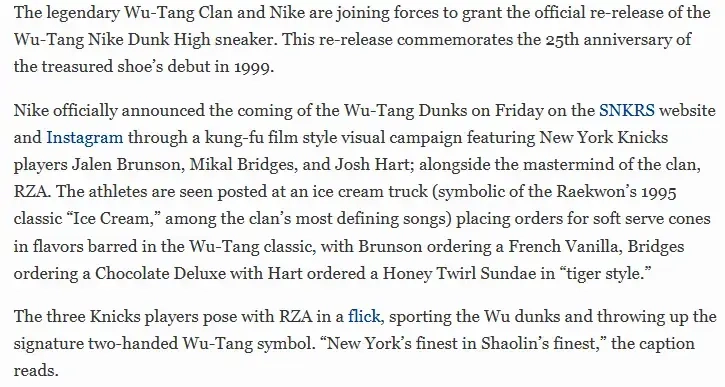
Branded mentions like these are helping Nike show up in Google AI Overviews:
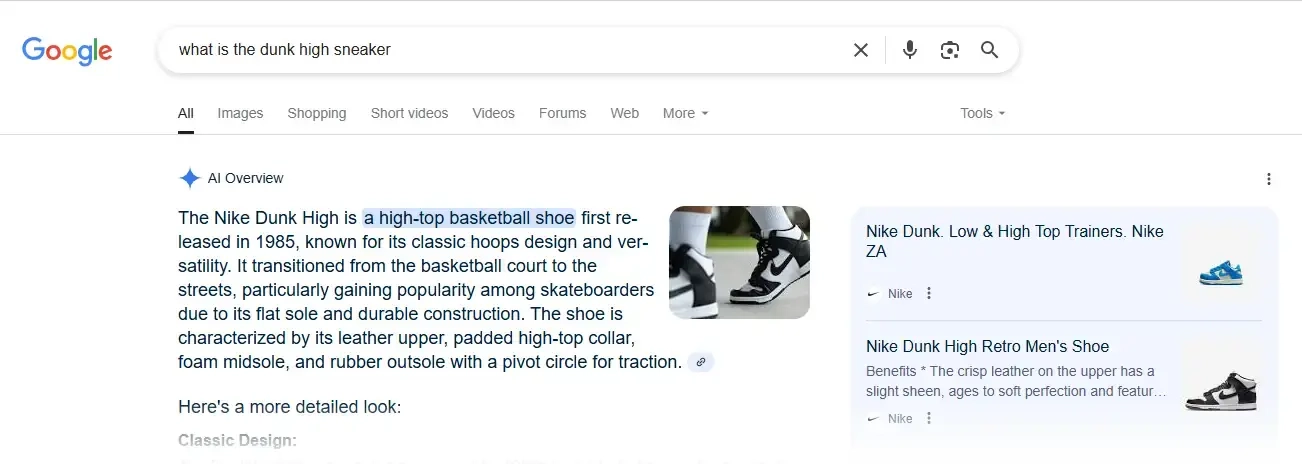
When your brand is mentioned consistently across the web, even without a hyperlink, AI starts connecting the dots.
These mentions help establish topical authority, brand presence, and entity recognition.
That’s why many link-building pros now think in terms of mentions, not just hyperlinks. It’s all part of building a digital footprint that AI can understand and trust.
Quality over quantity
AI doesn’t necessarily care how many backlinks you have if they’re low-quality, irrelevant, or spammy. It’s no wonder, then, that over 90% of link builders are now prioritizing link quality over quantity.
You can’t force your way to better rankings with low-quality links or shady link farms. Today’s AI-powered algorithms can pick up manipulation at lightning speed. So, what does matter?
Links from highly relevant sources.
Earned editorial mentions.
Links that appear naturally and add value.
Velocity over time.
The New Challenges of Link Building for AI Search
Even when AI summarizes your content, the user may never click through to your site. This is called the zero-click landscape.
AI Overviews and other tools often pull the answer into the interface with no further action from the user. That makes brand visibility and recognition seriously important.
If users see your brand but don’t visit your site, you still want that impression to build trust and reinforce your authority.
The challenge? Building links and mentions that serve dual purposes: helping rankings and increasing your brand’s surface area in AI summaries.
How to Ensure Your Website Performs Well in AI Search
Now that you know more about how AI search is transforming the SEO and digital marketing landscape, let’s look at how you can optimize your website to ensure it shows up (and is linked to) in AI summaries:
1. Build for humans first, AI second
Let’s be clear: AI search might be your new channel, but it’s people you need to impress first. If your content feels robotic, keyword-stuffed, or purely optimized for bots, it’s going to flop with both AI and actual readers.
Focus on creating helpful, clear, and genuinely useful content. AI tools like Google’s SGE are designed to surface the best possible answers, which usually come from content that puts the human reader first.
2. Prioritize contextual, niche-relevant backlinks
Relevance is now the name of the game. A signal link from a site tightly aligned with your topic is now far more valuable than five from vaguely related blogs.
Focus your efforts on acquiring backlinks from sites that talk about the same subjects your users care about and where your brand actually belongs in the conversation.
3. Lean into brand authority and recognition
AI tools like to highlight brands they recognize and trust. That means your job isn’t just to create content; it’s to appear throughout the web consistently.
Guest posts, interviews, quotes in industry roundups, and expert commentary all help build a profile that AI sees as a reliable source.
4. Get featured in high-trust publications
A mention in a top-tier publication, relevant trade magazine, or respected niche outlet? That’s fuel for both your search rankings and your AI visibility.
There are the kinds of sources that algorithms trust, and when they reference your site, it tells them your brand is worth paying attention to.
5. Use citations to influence AI overviews
AI search tools often summarize information from multiple sources, and one key input is citations.
By citing high-quality, well-known sources in your content, you strengthen the legitimacy of your page. It shows that you’ve done your homework and, more importantly, it makes it easier for AI systems to understand your content’s topic, scope, and trustworthiness.
Currently, over 25% of marketers prioritize developing authoritative content for AI citations, and you should do the same.
6. Encourage branded mentions even without links
You should aim to get mentioned by name across industry content, social media, podcasts, and newsletters.
It builds up your brand recognition, increasing the chances you’ll be featured when AI systems summarize related topics.
7. Improve entity recognition
Entity recognition is what allows AI systems to understand who you are, what you do, and how you’re related to various topics. It’s how AI picks up your brand across the web.
You can help them along by:
Using consistent naming conventions across the web.
Filing out your About and Contact pages clearly.
Including schema markup on your website.
Associating your brand with related keywords and themes across your site.
8. Improve technical SEO to ensure crawlability
All this great content and smart link building is pointless if your site isn’t technically sound. AI still leans on traditional search engines like Google Search to evaluate content. Google isn’t going to like broken links or slow loading speeds to find your latest content.
Keep your site crawlable and indexable by:
Fixing crawl errors in Google Search Console.
Using clean, semantic HTML.
Ensuring fast load times.
Implementing structured data.
9. Keep your content updated and fresh
AI search tools don’t prioritize outdated information. They want today’s most relevant, reliable information.
This means that pages that haven’t been touched in years get deprioritized, especially if your competitors are keeping their content current.
Set up a regular content schedule and refresh outdated stats, update links, and tweak your messaging as your industry evolves. Freshness signals matter for your website’s visibility, both to traditional search engines and AI summarizers.
10. Design for an excellent user experience
AI notices a bad user experience (UX). Pages that are hard to navigate, cluttered with ads, or difficult to read often don’t get surfaced as trusted sources. Why? Because they’re less helpful to the user, which is the whole point.
Ensure you optimize for clarity, speed, and mobile usability. For example, you should break up long walls of text, add structured headings, and make your content scannable.
11. Understand that user needs are constantly evolving
This is a big one. AI search is fundamentally user-focused, and user needs change constantly. What people are asking (and the way they ask it) today may not be what they ask next month, so you need to stay agile.
Monitor future search trends and how your industry is evolving. Watch how users are phrasing questions in tools like Google Search Console, Reddit, or AnswerThePublic. Expand your content to meet new search intent as it emerges.
Get Help Navigating AI Search with LinkBuilder
Let us leave you with two important points: SEO isn’t dead, and link building isn’t irrelevant. The game has simply changed, and the brands that adapt will come out on top.
As AI search continues to evolve, visibility now depends on more than just rankings. You need smart, niche-relevant backlinks, and you need your brand name to appear across trusted sources.
LinkBuilder specializes in modern link building, branded mentions, and visibility strategies tailored for today’s AI-driven search landscape. Our team stays ahead of the curve so you don’t have to, helping your brand get seen, cited, and surfaced where it matters most.
If you need help navigating this new world of AI search, feel free to get in touch with our expert team today, and let’s make sure AI finds you first.

